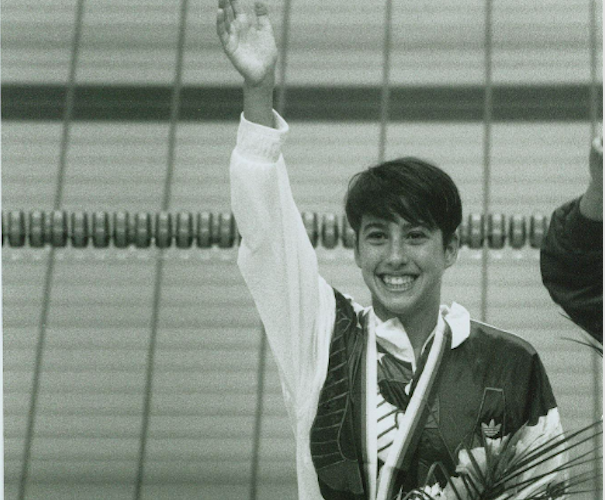International Women’s Day: When Janet Evans Went A 4:03 Over Eight Laps To Legendary Status

International Women’s Day: When Janet Evans Went A 4:03 Over Eight Laps To Legendary Status
To mark International Women’s Day, Swimming World recalls the day Janet Evans clock a stunning 4:03.85 over 400m freestyle on a trajectory to the pantheon of greats.
It doesn’t take a long gaze at the women’s results from the 1988 Olympics to understand something was amiss in the water. It only takes a quick glance to notice the disproportionate number of times East German women stood on the top step of the podium, and the frequency in which they stood on any step during medal ceremonies.
Word officially came later, but there was no doubt among athletes, coaches and reporters that the East Germany machine wasn’t merely running on talent. For years, and continuing through Seoul, the East Germans were powered by a higher-octane fuel than most others on the planet. That fuel, of course, came in the form of systematic doping assistance through State Plan 14:25.
But for a tiny 17-year-old girl from California, her Energizer Bunny approach and unmistakable windmill technique were enough to take down the Doping Demons. Simply, Janet Evans was nothing short of sensational, producing times in Seoul and during her career which were decades ahead of their time. As the American squad struggled in Seoul, Evans and Matt Biondi (five gold, a silver and a bronze) carried the flag.
In no way did Evans arrive in South Korea as an unknown commodity. It was quite the opposite actually. A year before the Seoul Games, Evans introduced herself to the aquatic world as a distance legend in development. Moulded and guided by Bud McAllister, Evans took down world records in the 400 freestyle, 800 freestyle and 1500 freestyle during the 1987 campaign, achievements which immediately brought the spotlight to Evans in the leadup to the 24th Olympiad.
As Seoul neared, Evans was routinely featured – in newspapers and magazines, and on television. There were great expectations placed on her small frame, just 5-5, 102 pounds. As much as Evans understood star athletes receiving attention, especially in front of an event as big as the Olympic Games, she yearned for the ability to fly, as the cliché goes, under the radar.
“I wish I could just come and go like everyone else,” Evans said prior to the 1988 Games.
“It’s a pain, really, especially when the TV cameras follow me around school. I mean, it’s embarrassing. The other kids tease you. Who knows what the teachers think? Then (the producers) sayd, ‘Just act natural.’ What a joke. How are you supposed to act natural in that situation? I wind up feeling dumb.”
As much as Evans wanted to flee the attention, she also didn’t let it bother her, a testament to young maturity and her ability to handle pressure. And so, when she arrived in Seoul, Evans was ready to go. Sure, the East German contingent might have seemed unbeatable to some, given their performance track record and the doping boost they were suspected of receiving. Evans didn’t care. She went about handling her workload.
While Evans was best known for her distance-freestyle exploits, the first event of her Olympic career was the 400 individual medley. It was a chance to get into the Olympic flow, but proved to bring much more. Clocking in at 4:37.76, Evans registered a victory of almost two seconds over Romania’s Noemi Lung, with East German Daniela Hunger capturing the bronze medal.
Evans was never one to make bold predictions. She left that task to McAllister, who had no problem offering possibilities for his pupil. One of the reasons for McAllister’s approach was based on Evans’ mentality, and never being overwhelmed by what her coach said.
“Janet likes to be challenged,” McAllister once said. “I know she’s always going to work hard. She’ll tell me what she can do, and I’ll stand there and time her, and she’ll be right on it. An athlete like Janet knows her body better than anyone. She asks me to help her set her goals, but she tells me how she feels physically. And she keeps asking for more. She’s the best I’ve ever seen at responding to pressure.”
McAllister was so sure of Evans’ preparation and ability heading into Seoul, he offered up this not-so-little prediction ahead of the 1988 Games: “As long as Janet stays healthy, no one can touch her. I’m confident she will win three Olympic gold medals.”
With the 400 individual medley title in her pocket, Evans’ second pursuit in Seoul was the 400 freestyle. At the 1987 U.S. Open, Evans broke the nine-year-old world record of Australian Tracey Wickham behind a time of 4:05.45. Yet, with East Germany’s Heike Friedrich coming off a win in the 200 freestyle and suspected of doping support, Evans was expected to face a severe challenge. It was anything but a tight affair.
En route to her second gold medal, Evans obliterated Friedrich and the rest of the field, prevailing in a world-record time of 4:03.85. It was a mark which would endure for almost 18 years, until Laure Manaudou touched the wall in 4:03.03 at the 2006 French Championships. Evans stared at the clock in disbelief after that race, trying to digest just how fast she went.

Janet Evans – Photo Courtesy: International Swimming Hall of Fame
To put the time in perspective, Evans’ effort would have placed her fourth at the 2012 Olympics in London and in the bronze-medal position at the 2013 World Championships. The performance remains one of the greatest of all-time, a showing which transcended time and was difficult for her rivals to comprehend.
“Janet Evans is in a different dimension,” Friedrich said. “A swimmer like Janet comes around once every 25 years.”
All that remained for Evans in Seoul was the 800 freestyle, and that event rolled around with finals on September 24. Although Evans did not match her world record, her time of 8:20.20 was plenty fast enough to fend off East German Astrid Strauss, who picked up the silver medal in 8:22.09. Evans’ mark would have collected bronze at the 2012 Games, further proof of her greatness and ahead-of-the-curve status. By completing her triple, Evans fulfilled the prediction of McAllister, not that she was overly concerned with his words.
“Bud makes all these predictions about what I’m going to do,” she said before Seoul. “ I say, ‘Ok, whatever,’ and then I forget it. Nothing matters except what I do in the pool, and I’m prepared to do well.”
Evans followed Seoul with additional epic performances, including a world record in the 800 freestyle at the 1989 Pan Pacific Championships. That time of 8:16.22 lasted just a shade under 19 years. Evans repeated as Olympic champion in the 800 freestyle in 1992 in Barcelona, where she also earned silver in the 400 free. Three world championships also dot her resume, and she is forever a legend.
“I’m not worried about it,” Evans said of the pressure of her first Olympiad. “Everyone says, ‘Whoa, the Olympics,’ but it’s just another meet. You swim the same distances. It’s just that more people are watching.”
And years later, remembering.



